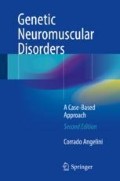Abstract
Facioscapulohumeral muscular dystrophy (FSHD) is characterized by progressive muscle weakness with focal involvement of the facial, shoulder, and arm muscles. Muscle weakness first affects the facial muscles and upper extremities and later progresses to involve the lower extremities. The pattern of weakness is usually asymmetric. The onset of symptoms occurs between 3 and 50 years of age. Early onset of the disease is associated with more widespread muscle weakness. Although facial weakness (difficulties whistling, smiling, and closing the eyes) is an early feature, the shoulder muscle involvement (difficulties lifting the arms, scapular winging, and sloping shoulders) is the most frequent patients’ complaint.
Muscle involvement progressively affects wrist extension, the abdominal muscles, knee, and foot extensor muscles. Sensory, cardiac, and neurological signs are rare.
FSHD is a dominant inherited disorder presenting genetic heterogeneity. FSHD type 2 shows digenic inheritance, since it is caused by the combination of a heterozygous mutation in the SMCHD1 gene and presence of a haplotype on chromosome 4 that is permissive for DUX4 expression. Sacconi et al. found that mutation in the SMCHD1 gene is a modifier of disease severity in patients with FSHD1. FSHD type 1 and type 2 are clinically indistinguishable, and the disease mechanisms of FSHD1 and FSHD2 converge at the level of D4Z4 chromatin relaxation and variegated expression of DUX4 in skeletal muscle.
Access this chapter
Tax calculation will be finalised at checkout
Purchases are for personal use only
References
Lemmers RJ, Tawil R, Petek LM, et al. Digenic inheritance of an SMCHD1 mutation and an FSHD-permissive D4Z4 allele causes facioscapulohumeral muscular dystrophy type 2. Nat Genet. 2012;44:1370–4.
Sacconi S, Lemmers RJ, Balog J, et al. The FSHD2 gene SMCHD1 is a modifier of disease severity in families affected by FSHD1. Am J Hum Genet. 2013;93:744–51.
Author information
Authors and Affiliations
Rights and permissions
Copyright information
© 2018 Springer International Publishing Switzerland
About this chapter
Cite this chapter
Angelini, C. (2018). Facioscapulohumeral Muscular Dystrophy Type 2. In: Genetic Neuromuscular Disorders. Springer, Cham. https://doi.org/10.1007/978-3-319-56454-8_33
Download citation
DOI: https://doi.org/10.1007/978-3-319-56454-8_33
Published:
Publisher Name: Springer, Cham
Print ISBN: 978-3-319-56453-1
Online ISBN: 978-3-319-56454-8
eBook Packages: MedicineMedicine (R0)

